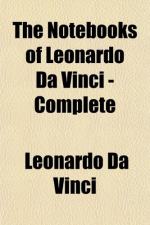691.
Love, Fear, and Esteem,—
Write these on three stones. Of servants.
692.
Prudence Strength.
693.
Fame alone raises herself to Heaven,
because virtuous things are in favour
with God.
Disgrace should be represented upside
down, because all her deeds are contrary
to
God and tend to hell.
694.
Short liberty.
695.
Nothing is so much to be feared as Evil
Report.
This Evil Report is born of life.
696.
Not to disobey.
697.
A felled tree which is shooting
again.
I am still hopeful.
A falcon,
Time.
[Footnote: I. Albero tagliato. This emblem was displayed during the Carnival at Florence in 1513. See VASARI VI, 251, ed. MILANESI 1881. But the coincidence is probably accidental.]
698.
Truth here makes Falsehood torment
lying tongues.
699.
Such as harm is when it hurts me not,
is good which avails me not.
[Footnote: See PI. LX, No. 2. Compare this sketch with that on PI. LXII, No. 2. Below the two lines of the text there are two more lines: li guchi (giunchi) che ritego le paglucole (pagliucole) chelli (che li) anniegano.]
700.
He who offends others, does not secure himself.
[Footnote: See PI. LX, No. 3.]
701.
Ingratitude.
[Footnote: See PI. LX, No. 4. Below the bottom sketches are the unintelligible words “sta stilli.” For “Ingratitudo” compare also Nos. 686 and 687.]
702.
One’s thoughts turn towards Hope.
[Footnote: 702. By the side of this passage is a sketch of a cage with a bird sitting in it.]
Ornaments and Decorations for feasts (703-705).
703.
A bird, for a comedy.
[Footnote: The biographies say so much, and the author’s notes say so little of the invention attributed to Leonardo of making artificial birds fly through the air, that the text here given is of exceptional interest from being accompanied by a sketch. It is a very slight drawing of a bird with outspread wings, which appears to be sliding down a stretched string. Leonardo’s flying machines and his studies of the flight of birds will be referred to later.]
704.
A DRESS FOR THE CARNIVAL.
To make a beautiful dress cut it in thin cloth and give it an odoriferous varnish, made of oil of turpentine and of varnish in grain, with a pierced stencil, which must be wetted, that it may not stick to the cloth; and this stencil may be made in a pattern of knots which afterwards may be filled up with black and the ground with white millet.[Footnote 7: The grains of black and white millet would stick to the varnish and look like embroidery.]




